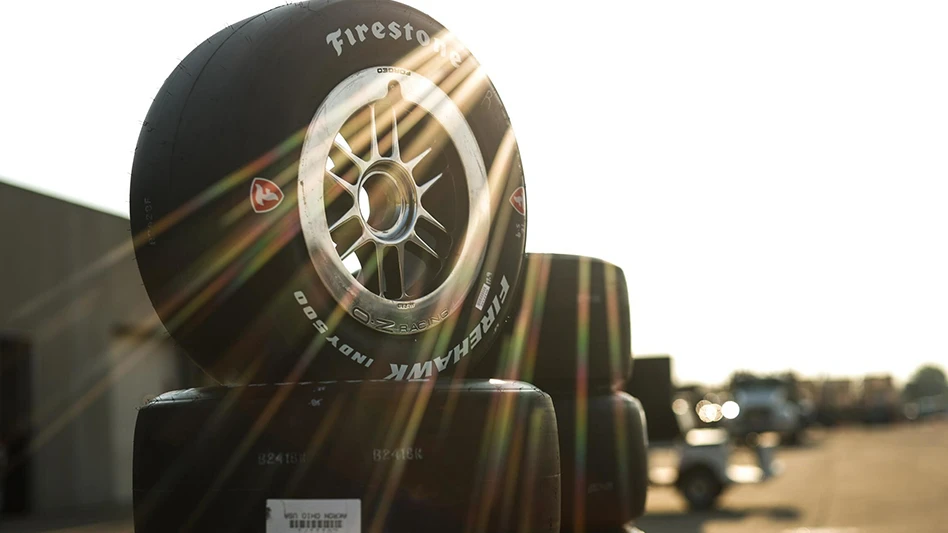
Image courtesy of Bridgestone Americas Inc.
In partnership with the Indianapolis Motor Speedway, Michigan-based Penske Corp. and London-based Shell, Bridgestone Americas says its goal is to make the 107th running of the Indianapolis 500 the most sustainable in the history of the NTT IndyCar Series. The race is scheduled for May 28.
As the series’ exclusive tire supplier, Nashville, Tennessee-based Bridgestone says it has incorporated International Sustainability & Carbon Certification (ISCC Plus certified) recycled butadiene, a monomer produced from hard-to-recycle postconsumer shopping bags, film, stretch wrap and other flexible polymer packaging, developed in partnership with Shell, in all Firestone Firehawk race tires used at the Indy 500. Bridgestone adds it will manufacture all race tires for the 2023 season at the ISCC Plus-certified Advanced Tire Production Center (ATPC) in Akron, Ohio.
RELATED: Bridgestone radial tire plant earns ISCC Plus recognition
Additionally, Bridgestone has partnered with Penske and Indianapolis Motor Speedway to transport all race tires to the racetrack with the electric 2023 Freightliner eCascadia from Penske Truck Leasing’s fleet of electric vehicles during the month of May.
“We are driving to increase sustainability in every area of our business, and we’re thrilled to showcase our commitment to sustainability in ‘The Greatest Spectacle in Racing,'” says Paolo Ferrari, president and CEO of Bridgestone Americas and joint global chief operating officer of Bridgestone Corp. “We are further committed to a thriving and more sustainable future in motorsports.”
This year at the Indy 500, all tires used for practice, qualifying and the race itself will incorporate ISCC Plus certified recycled-attributed butadiene, a monomer produced from hard-to-recycle plastic, in the synthetic rubber in the tire. Bridgestone says the new monomer replaces the petroleum-based monomer and will be supplied by Shell, the race series’ official fuel, oil and lubricant supplier.
Bridgestone is manufacturing all Firestone Firehawk race tires for the 2023 Indy 500 at its ISCC Plus certified ATPC in Akron. The certification was awarded to the facility in November 2022 for its transparency and traceability of sustainable raw materials including bio, bio-circular and circular-based synthetic rubber. According to the company, the ATPC is one of five Bridgestone facilities in North America to be awarded the certification. One of the company’s sustainability goals is to develop tires made with 100 percent renewable and recycled materials by 2050.
“We’re pleased with the performance of our Firestone Firehawk race tires during practice and qualifying for the Indianapolis 500,” Bridgestone Americas Chief Engineer Cara Krstolic says. “Recycled monomer was used in the production of these tires and the tires have proven to maintain the same high standard of performance we expect. In fact, they were part of multiple qualifying records, including the fastest four-lap average speed for a pole winner (Alex Palou, 234.217 mph), the closest front row (.103 of a mph separating Palou from No. 3 starter Felix Rosenqvist) and the fastest starting field in Indy 500 history (average speed of 232.184 mph).”
Bridgestone says Firestone Firehawk race tires feature sidewalls made using guayule-derived natural rubber and are being used on all street courses this season.
Latest from Recycling Today
- Vermeer announces plan to build new facility in Des Moines metro area
- PureCycle, Toppan partner on packaging containing PCR
- LKQ to focus on simplification, productivity in uncertain demand environment
- Supreme Court strikes down IEEPA tariffs
- Redwood expands San Francisco R&D footprint
- Constellium posts record Q4 adjusted EBITDA
- QCC torches include customizable features
- Umicore finishes 2025 with increased earnings





